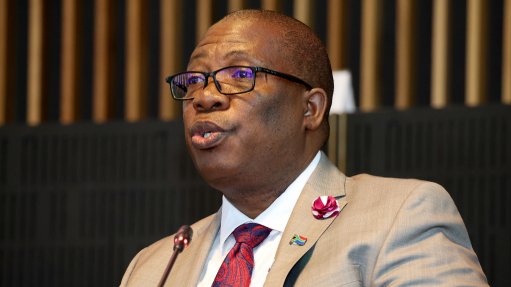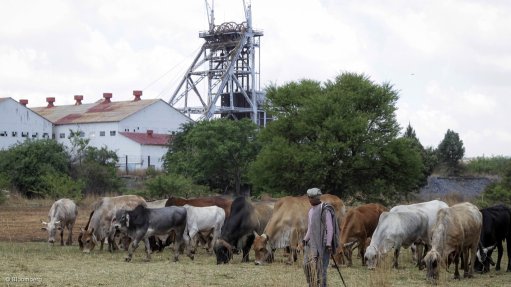Parliament hears recommendations on amending copyright, performers protection Bills
In seeking to amend the Copyright Act of 1978 and the Performers’ Protection Act of 1967, Parliament, on August 18, began the process of considering certain Constitutional concerns relating to the Copyright and Performers’ Protection Amendment Bills previously passed by the National Assembly and the National Council of Provinces (NCOP).
Trade, Industry and Competition Minister Ebrahim Patel briefed the National Assembly’s Portfolio Committee on Trade and Industry on matters related to the two Bills.
He set out the key objectives of the review of copyright, the provisions of the Bills and the reservations raised by President Cyril Ramaphosa on specified areas of the Bills which may not pass Constitutional muster.
This includes retrospective application of the sharing of royalties for musicians and other originators of creative works such as visual artistic works.
Patel’s briefing to the portfolio committee was followed by a briefing by Parliament’s legal adviser Advocate Charmaine van der Merwe on the same matters. It is expected that the committee’s deliberations will continue next week.
Other matters included whether the Bills went through the correct Parliamentary process, the delegation of certain legislative powers to the Minister and whether the Bills’ exceptions on the rights of copyright holders constituted arbitrary deprivation of property.
As such, Patel recommended that the committee reconsider the retrospectivity provisions and that it removes the powers assigned in the Bills to the Minister.
Ramaphosa’s reservation regarding retrospective and arbitrary deprivation of property, relates to the introduction of a new Section 6A in the Copyright Amendment Bill, which entitles the author of a musical or literary work, who has assigned the copyright in the work to someone else in the past, to continue sharing in the profits derived from the exploitation of the work, in the form of the payment of royalties.
The amendment Bill also introduces the new sections 7A and 8A, which confer comparable rights on the authors of visual artistic works and on the performers of audio visual works. It applies to all past contracts and does not distinguish based on the fairness or otherwise of past contracts.
Patel says that, while the objectives of providing redress to artists who have been unfairly treated in contracts in the past is valid and legitimate, the Bills have provisions that as currently worded, could be regarded as arbitrary by the courts.
“I have taken note that various legal opinions hold that the Ministerial powers in the Bills are sufficiently qualified as to address concerns about impermissible delegation, but as they were an attempt to cure potential Constitutional breaches on the formulation of retrospectivity, they would be redundant if those clauses are changed and should therefore be removed.”
He notes that amendments could be made without losing the key aim of the draft legislation; and that alternative mechanisms to address the challenges of redress and to support those creators who are victims of past exploitation, may need to be considered.
The Bills seek to regulate the exercise of certain intellectual property rights.
Patel says copyright creates a monopoly for a given period and the intention of the law was to strike a balance between the various interests of the originators of certain types of works, the owners of the copyright and users of the works. “For this reason, all countries permit some exceptions to enable the public to use copyrighted material in specific circumstances where the public interest warrants it.”
He says Parliament is being asked to review the processes followed and whether the public had sufficient opportunity to consider the specific language used in the new fair-use regime that the draft legislation introduces.
Going forward, the portfolio committee will deliberate on the matters raised by Ramaphosa – which cover six areas, including the classification of the Bills (which affects the processes of involvement by the NCOP), provisions that introduce retrospective remedies which may be regarded as arbitrary deprivations of property; the delegation of legislative power to the Minister; the extent of public participation in the process of formulating the fair-use clause; the list of copyright exceptions; and International Treaty implications.
Article Enquiry
Email Article
Save Article
Feedback
To advertise email advertising@creamermedia.co.za or click here
Announcements
What's On
Subscribe to improve your user experience...
Option 1 (equivalent of R125 a month):
Receive a weekly copy of Creamer Media's Engineering News & Mining Weekly magazine
(print copy for those in South Africa and e-magazine for those outside of South Africa)
Receive daily email newsletters
Access to full search results
Access archive of magazine back copies
Access to Projects in Progress
Access to ONE Research Report of your choice in PDF format
Option 2 (equivalent of R375 a month):
All benefits from Option 1
PLUS
Access to Creamer Media's Research Channel Africa for ALL Research Reports, in PDF format, on various industrial and mining sectors
including Electricity; Water; Energy Transition; Hydrogen; Roads, Rail and Ports; Coal; Gold; Platinum; Battery Metals; etc.
Already a subscriber?
Forgotten your password?
Receive weekly copy of Creamer Media's Engineering News & Mining Weekly magazine (print copy for those in South Africa and e-magazine for those outside of South Africa)
➕
Recieve daily email newsletters
➕
Access to full search results
➕
Access archive of magazine back copies
➕
Access to Projects in Progress
➕
Access to ONE Research Report of your choice in PDF format
RESEARCH CHANNEL AFRICA
R4500 (equivalent of R375 a month)
SUBSCRIBEAll benefits from Option 1
➕
Access to Creamer Media's Research Channel Africa for ALL Research Reports on various industrial and mining sectors, in PDF format, including on:
Electricity
➕
Water
➕
Energy Transition
➕
Hydrogen
➕
Roads, Rail and Ports
➕
Coal
➕
Gold
➕
Platinum
➕
Battery Metals
➕
etc.
Receive all benefits from Option 1 or Option 2 delivered to numerous people at your company
➕
Multiple User names and Passwords for simultaneous log-ins
➕
Intranet integration access to all in your organisation


















